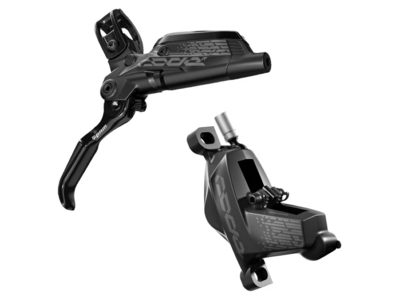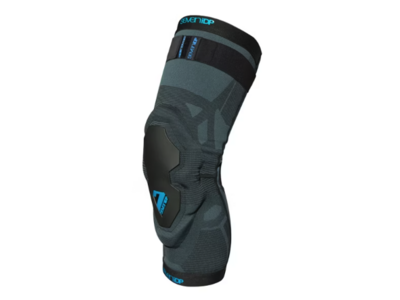Distinguishable by their dual crown forks, aggressive geometry and tight range of gears, the name of the game with downhill mountain bikes is purely descending performance. Over the past few months, we had the privilege of testing five descent-hungry bikes from Pivot, Trek, Canyon, YT and Scott. Each bike presented its own unique suspension design, frame features, wheel size configurations and component build kits. With a variety of bikes in our test group, the goal was simple: to find out where each bike excelled or came up short under the abuse of downhill riding. And ultimately, help riders decide which bike is best for their style of riding. It was awesome experience getting back to our roots and seeing what modern downhill bikes are capable of! Follow along as we recap our impressions of each bike and for more information about any of the downhill bikes tested, head to the links below for the full reviews.
Pivot Phoenix 29




Phoenix 29 Full Review
- Wheel Size: 29-inch
- Frame Material: Carbon
- Suspension Design: DW-Link
- Geometry Adjustments: No adjustments
- Chainstay Length: 443mm
- Size Tested: Large, 460mm reach
- Weight: 36-pounds (16.3kg, no pedals)
- MSRP: $6,999 USD
- More information: www.pivotcycles.com
Strengths
| Weaknesses
|
Trek Session 8




- Wheel Size: 29-inch, 27.5-inch and mixed wheel configuration options
- Frame Material: Alpha platinum aluminum
- Suspension Design: High-pivot with ABP (Active Braking Pivot)
- Geometry Adjustments: Mino Link flip chip adjusts head tube angle, bottom bracket height
- Chainstay Length: 445mm (size R2)
- Size Tested: R2, 465mm reach
- Weight: 37.9-pounds (17.2kg, no pedals)
- MSRP: $4,999 USD (GX Build Kit)
- More Information: www.trekbikes.com
Strengths
| Weaknesses
|
Canyon Sender 6




Sender 6 Full Review
- Wheel Size: 27.5-inch
- Frame Material: Aluminum
- Suspension Design: Triple Phase Suspension design (four-bar linkage)
- Geometry Adjustments: Chainstay length
- Chainstay Length: 430mm or 446mm
- Size Tested: Large, 460mm
- Weight: 38.8-pounds (17.6kg, no pedals)
- MSRP: $3,399 USD
- More Information: www.canyon.com
Strengths
| Weaknesses
|
YT Tues Comp




Tues Comp Full Review
- Wheel Size: 27.5-inch
- Frame Material: Aluminum
- Suspension Design: V4L design (Virtual four-bar linkage)
- Geometry Adjustments: No adjustments
- Chainstay Length: 440mm
- Size Tested: X-large, 474mm reach
- Weight: 38.2-pounds (17.3kg, no pedals)
- MSRP: $3,499 USD
- More Information: www.yt-industries.com
Strengths
| Weaknesses
|
Scott Gambler 930

As we covered in the video, we had originally planned to test Scott’s Gambler 930 downhill bike as our fifth and final test bike. Unfortunately, due to unique circumstances, we were unable to conduct a full review of our Gambler test bike. As the last bike scheduled for testing, our Gambler was being ridden throughout summer by Vital videographer and contributor, Logan Brown. Always eager to gather as many rider impressions as possible during testing, Logan logged a few runs on the Gambler while we tested and filmed the other four downhill bikes. When we were finally ready to toss a leg over Scott’s Gambler 930, Logan had four days of bike park laps on the bike.
As we began our initial impressions and bike setup, we were able to get two days of testing under our belts. Unfortunately, on the third day of testing and the fourth run of the day, the X-Fusion Vector R coil rear shock had a reservoir blow-out, puking oil all over the bike. With the shock out of commission and Summer coming to a close, we realized sourcing a replacement shock was out of the question. We also became aware that since receiving our test bike in the Spring, Scott was no longer selling the 930 build kit and had updated their complete bike options. Left with an unrideable bike and a build kit that no longer exists, we are unable to provide a full review of Scott’s Gambler downhill bike. However, from our few days of testing, we were able to acquire some initial on-trail impressions that hinted at the capabilities of the Gambler.

We rode the heavier and less expensive aluminum-framed Gambler which still features the same geometry adjustments found on the carbon-framed Gambler, allowing riders to run either 27.5-inch or 29-inch wheels while maintaining suspension kinematics. During our short time riding the Gambler, We only rode with dual 29-inch wheels. The size large Gambler we rode had a 460mm reach and 435mm chainstay length. With very similar geometry numbers to our other test bikes, the size and length of the Gambler was immediately comfortable and confidence-inspiring. The combination of an appropriately long wheelbase and 29-inch wheels made the Gambler a stable and planted machine at speed.



In more technical and rough sections of trails, the virtual four-bar suspension design performed well, providing a predictable ride. As is expected from a four-bar design, in chattery bumps there was some feedback transferred through to our feet. We did manage to squeak in a few flow trail runs on the Gambler and felt that is where the bike excelled most. We immediately felt comfortable tackling jumps on the first run and the suspension platform provided great support to push against when pumping the bike. Overall, our initial impressions lead us to believe that the cheaper, aluminum Gambler option is ideal for intermediate free-riders or racers looking to receive a fun downhill bike that remains controlled in the rough at a reasonable price. There are no gimmicks or fancy frame features - just a classic, 4-bar suspension design with the added benefit of being able to play around with geometry adjustments and mixed wheel variations.

If Scott’s Gambler sounds like it might suit your riding style, head over to www.scott-sports.com and check out their current build kit options!
Of the bikes we tested, which downhill bike would you choose to ride? Or if you love another downhill bike that we didn't test this Summer, let us know in the comments and maybe we can put it to the test next season! And for all of you long-time downhill rippers, we'd love to hear why your 2006 Iron Horse Sunday is still the best downhill bike ever made.
About The Testers
Jason Schroeder - Age: 26 // Years Riding MTB: 15 // Height: 6' (182cm) // Weight: 168-pounds (76.2kg)
A once-upon-a-time World Cup downhill racer turned desk jockey, Jason has spent years within the bicycle industry from both sides of the tape. A fan of all day adventures in the saddle or flowing around a bowl at the skatepark, he doesn't discriminate from any form of two wheel riding. Originally a SoCal native now residing in Boise, Idaho, you can find Jason camped out in his van most weekends at any given trailhead in the greater Pacific NorthWest.
Sean McClendon - Age: 36 // Years Riding: 21 // Height: 5'10" (177cm) // Weight: 190-pounds (86.2kg)
"Griz" is a battered veteran of MTB gravity racing. Following a major crash during the 2010 USA National Championship Pro downhill race, he put in the hours and fought his way back to health and the fun that is two wheels. Griz has ridden for a number of the USA's top teams throughout his racing career, testing prototype frames and components along the way. He remains motivated by the mantra "whips don't lie" and you'll often find him perfecting his high-flying sideways aerial maneuvers while living the #pinelife in Boise, Idaho.







View replies to: Vital MTB Test Session - Downhill Bike Recap
Comments